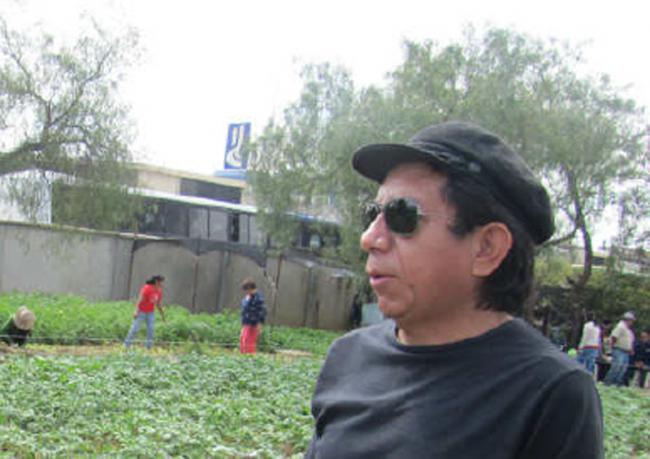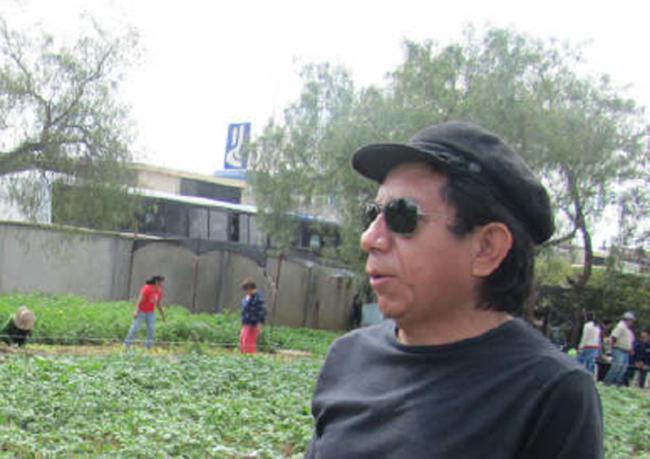
On a beautiful late summer morning in Cochabamba, Bolivia, Oscar Olivera, leader of the famous Bolivian Water War that catalyzed the mass movement in 1999 that ultimately brought down a neo-liberal regime, is showing off a wildly productive community garden. Why is a union and community leader internationally known for advancing democratic participation, anti-corporate organizing and climate activism, throwing his considerable political capacity into the community garden movement?
Visiting the Cochabamba Renters Organization garden project in the center of Cochabamba, a city of 1.2 million people, I was overwhelmed by the intense level of cultivation in a small space. The garden, only 800 by 800 meters (2,624 x 2,624 feet), is located on state land that was once a train yard. After decades of petroleum, gas, chemicals, garbage and abuse, the land was toxic but it was a space that no one else seemed to want.
The movement took off seven years ago when these renters petitioned the local government for the land so they could create a community garden. Many were recent migrants from the countryside with agricultural experience but others were a generation or more away from these traditions but enthusiastic to learn. Oscar says, “The renters didn’t have much money to buy fresh food in the market so starting a community garden seemed like a good step forward.”
Bolivia has a strong tradition of community and workplace organizing that extends back to its largely indigenous roots, extensive labor organizing and strong history of mass mobilizations against dictatorships and neoliberal governments. While Evo Morales, third-term president of Bolivia and an indigenous peasant leader, was brought to power in 2005 by mass movements, too many of these have either been incorporated into the government or marginalized by it, minimizing the pressure on Evo to make good on his promises. So Oscar Olivera and his comrades, always seeking a way to advance the power of the people, saw the need of local renters as a way to organize again.
Since the Spanish conquest in 1500, Bolivia’s export economy has relied on extraction of abundant natural resources. First silver, then tin, and, now, natural gas and GMO soy production, have been drained out, almost completely for the benefit of foreign and local elites, without regard to the well-being of the land or the people. Toxic wastes from mining have been dumped for 500 years; vast areas of highly fertile land, particularly in the eastern lowlands, have been put into agri-business production replete with GMOs, pesticides and chemical fertilizers.
These processes have exacerbated an extractive use of land instead of traditional agro-ecological and organic methods that further support the fertility and long-term productivity of the land and help to sequester carbon deep in the soil instead of releasing it in the air where it adds to climate change.
Bolivia is experiencing a severe water shortage. The astonishingly beautiful snow-capped mountains surrounding La Paz and high plateau, the altiplano, are melting at an alarming rate. The valley city of Cochabamba, at 8,500 feet above sea level, was once surrounded by snow-capped mountains. Now they stand bare. Shorter and less intense rainy seasons and highly polluted rivers have made drinking water and irrigation a constant challenge.
Over 1,000 years ago, indigenous groups in the eastern lowlands created a system of irrigation pools that have been continuously used, ensuring enough water for crops. But since the conquest, these systems have consistently deteriorated as extractive industries despoiled the land and water.
President Evo Morales has defined himself as a climate activist and a socialist. In 2010, five years after his first election to the presidency, he organized a global climate conference that drew over 10,000 activists, mostly from the western hemisphere. But as a poor nation dependent on extraction, Evo’s government has addressed Bolivia’s widespread poverty through increasing taxes, mostly on natural gas. He has been widely criticized for adding to environmental problems by expanding this dependency on extraction to pay for social programs. Yet Evo’s administration has also supported some renewable energy projects as well. Evo held a second climate conference, right before the major climate talks in Paris at the end of 2015 again with the intention of underscoring that economically developed nations need to take greater responsibility for their past and present contributions to climate change.
Eli Peredo, Director of the Fundación Solon, worries that the government will adopt natural gas fracking and carry out its promises to develop a nuclear power plant. This highlights an enormous dilemma for self-professed progressive governments in the global south: they see the easiest way to reduce poverty is through extractive industries, the same strategies of capital accumulation used by the global north. While Evo can boast that, under his leadership, over 40% of Bolivians have been lifted out of poverty—no small feat-- his administration has also added to environmental destruction. But in the absence of a vibrant and aggressive environmental justice movement, the government is likely to continue on its present path.
So it’s back to the garden to seek solutions. Can progressive community organizers help to stir Bolivians back into action, building the kind of communities that are resilient and mobilized enough to push for policy changes from their government? For Oscar Olivera and Aniceto Hinojosa, the way forward is to support a movement of neighbors that creates communities of productivity, health and struggle. Oscar connects this work globally through participation in the Four Bridges Traveling Permaculture Institute, developing projects to support indigenous urban and rural farming communities around the globe.
Eighty to one hundred families are working on the small plot of land in Cochabamba. Many also have kitchen gardens close to their houses. Some of the best teachers have been the elders who have farmed for a living in the past who provide workshops, particularly for youth. They gather compost from the massive local food markets and bring food scraps to the garden by the truckload. It takes about 3-4 months in this warm climate for the compost to decompose allowing these gardeners to detoxify the land and grow food directly in the soil. This has been an enormous effort of dedicated work by hundreds of people.
The lettuce, peppers, radishes, pumpkins, squash, potatoes and other crops now glisten in the dark and lush soil. A handful of shade trees keep watch over the garden, standing witness to the rotation of crops and the periodic resting of the soil to expand fertility, all long-standing traditional practices.

We visited during a ceremony to ensure healthy conditions for the next year. After burning miniatures of wished-for items, as is the custom in Bolivia, and acknowledging the power of Pachamama (mother earth) and the four winds, garden coordinator co-organizer of the garden with Oscar, Aniceto Hinojosa started a meeting. With about 35 gardeners present, Aniceto introduced the idea of petitioning the government to get land for more gardens.
Oscar Olivera steps back from the meeting, giving space for others to lead. Oscar Olivera steps back from the meeting, giving space for others to lead. “This work is on a very small scale right now,” he says. “But I believe we are connecting this group of people to the broader world of climate activists, people who understand the importance of using agriculture to mitigate climate change while feeding people.”
Like urban gardeners all over the world, especially organized gardeners who see themselves as stewards of the land, these organized Cochabambinos produce many benefits. They feed their families, strengthen communities, reclaim the “commons” or publicly used space and inspire others to work collectively for the common good. Their gardens absorb carbon and storm water, support cleaner air, reduce heat and utilize food wastes for their crops.
Connecting to the US experience, these Bolivian community gardeners join the ranks of D-town Farm in Detroit, El Jardin in Los Angeles, the People’s Grocery in Oakland, CA, NYC Community Garden Coalition, and so many others. Is it possible to have a movement that militantly advances community controlled food systems that mitigate climate change? Is it possible to transform these movements into a sturdy tool for social change? It remains to be seen. But first we grow and eat and share. Oscar Olivera, once again, is on to something.
Nancy Romer, Ph.D., is Professor Emerita of Psychology, Brooklyn College, City University of New York and founder of the Brooklyn College Community Partnership and the Brooklyn Food Coalition. She is on the coordinating committee of the People’s Climate Movement-New York. She visits Bolivia frequently.

